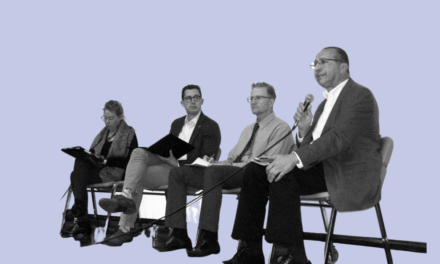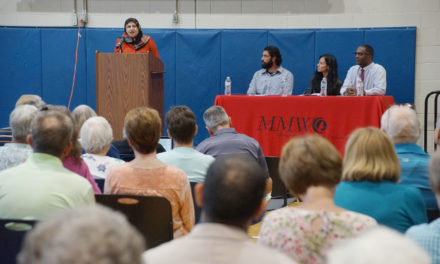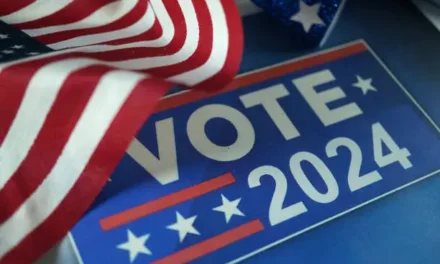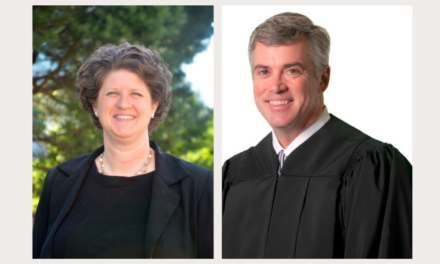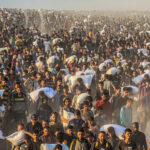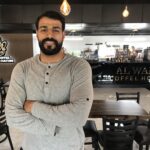
Photos by Kamal Moon
“We are being faced with a moral reckoning that is probably the most important one any of us will face in our lifetimes,” Rabbi Brant Rosen told an audience of students, faculty and community members at Marquette’s Weasler Auditorium in Milwaukee.
“The first order of business right now is to do what we are doing right here, raising our voices … to speak out against the genocide that is going on in Gaza,” said Rabbi Brant Rosen in mid-December to an audience at Marquette University. “There is truly a movement of resistance arising. Almost every day we’re seeing protests in the streets and there is a very strong and powerful Jewish voice that is part of these protests around the country and around the world.”
Marquette University’s Department of Languages, Literatures and Cultures invited Rosen, the founding rabbi of Tzedek Chicago, a congregation in Evanston, Illinois, to give a talk he titled A Rabbi’s Vision for a Shared Future with Palestinians. Faced with the now three-month Israeli military assault on Gaza that the Gaza Ministry of Health reports has killed more than 20,000 people, of which 70% are women and children, Rosen changed the topic.
“I don’t think it would be at all wise for me to offer some kind of vision going forward when we are in the midst of such deep destruction of human life,” he said. “We are in a moment of deep pain and uncertainty. Old paradigms have been completely destroyed and the future is up in the air … Now we must raise voices of conscience and resist those who would stifle those voices.”
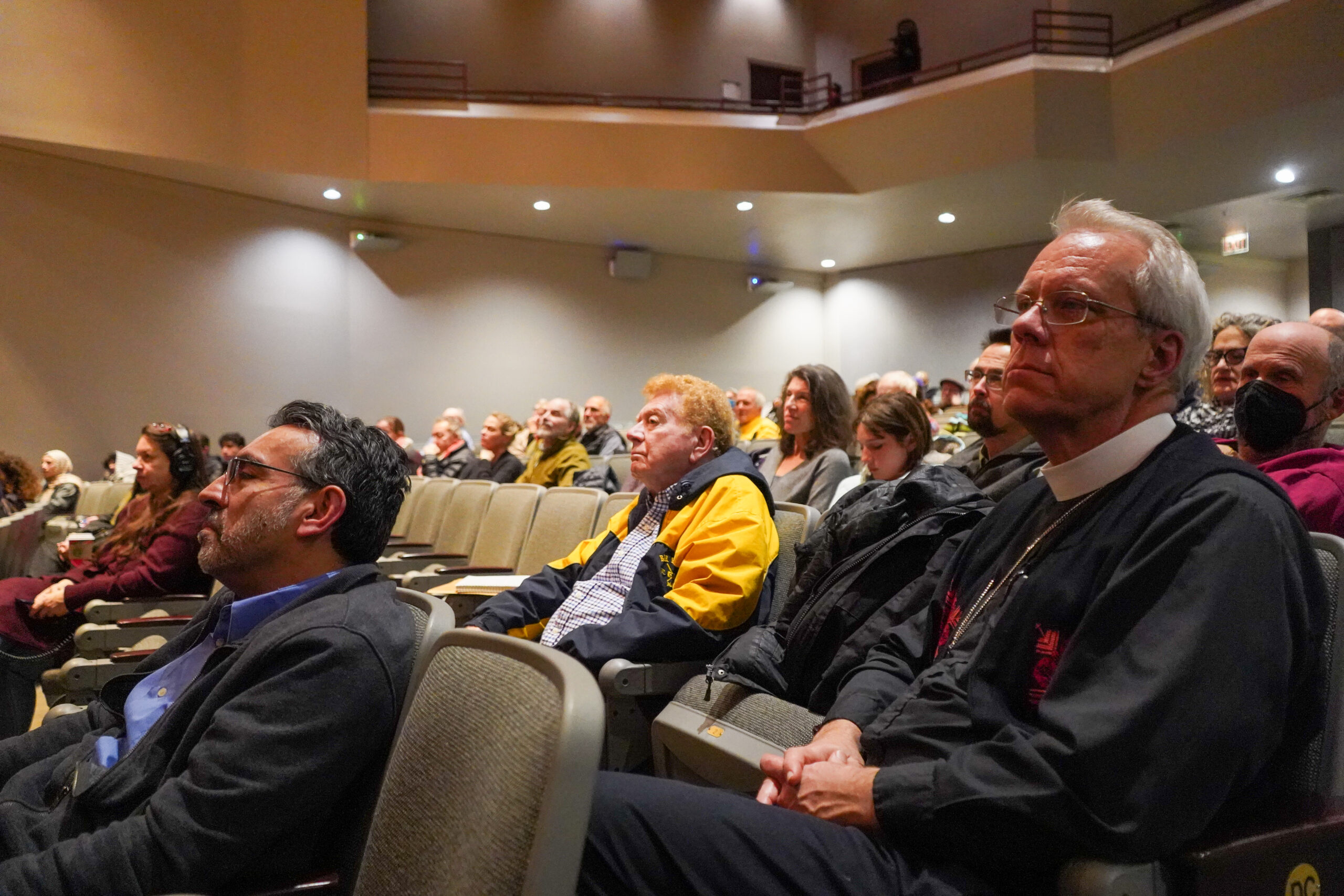
Rev. Paul D. Erickson, bishop of the Greater Milwaukee Synod of the Evangelical Lutheran Church in America (on far right) spoke briefly on behalf of the Wisconsin Churches for Justice in Palestine.
“This is the time for speaking out”
“We are being faced with a moral reckoning that is probably the most important one any of us will face in our lifetimes,” Rosen told an audience of students, faculty and community members Dec. 13 at Marquette’s Weasler Auditorium in Milwaukee. “History will record what we did. Did we speak out or did we remain silent or did we try to rationalize it away?
“This is a time when speaking out is increasingly dangerous,” he continued. “Voices of conscience are being attacked. They’re being silenced. The fact that we are having this gathering here tonight at all is a small but hopeful sign that such conversations and such statements of conscience are indeed possible.
“If there’s any single message I could offer at this particular moment, it is this is the time for speaking out, for being in the streets, for resisting those who would tell us to remain silent. It’s a time, as Martin Luther King once said, to break silence.”
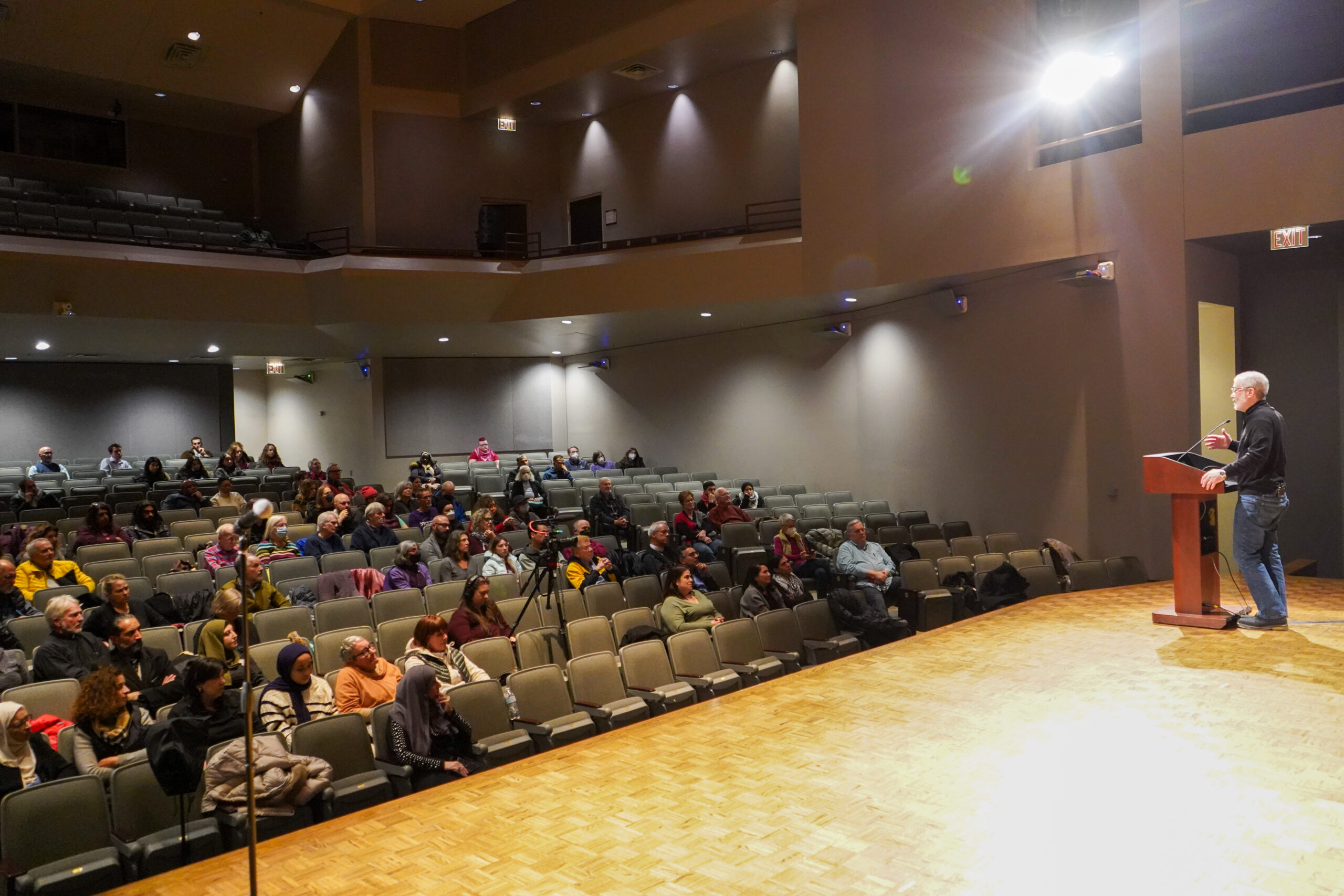
Rabbi Rosen singular message was that now is the time for speaking out, for being in the streets, for resisting those who would tell us to remain silent, a time to break silence.
Voice of a new generation of American Jews
Rosen is “the voice of a new generation of American Jews who are refusing to allow the right-wing voices of the Jewish world to define Judaism,” Tikkun Magazine editor Rabbi Michael Lerner wrote in a review of Rosen’s 2012 book (updated in 2017) Wrestling in the Daylight: A Rabbi’s Path to Palestinian Solidarity, a compilation of posts and readers’ comments from Rosen’s Jewish social justice blog Shalom Rav.
Rosen served as an ordained rabbi in Jewish Reconstructionist congregations in Los Angeles, Denver and Chicago. He publicly wrestled with his relationship to Israel, openly questioning his lifelong Zionism, his biography says. He has become a prominent Jewish presence in the Palestine solidarity movement, co-founding the Jewish Voice for Peace Rabbinical Council. In 2014, he resigned from his post as rabbi for a Chicago congregation to become the Midwest regional director of the American Friends Service Committee, a Quaker-founded, multi-faith organization that aims to challenge injustice and build peace.
Rosen and a few friends started a congregation in spring 2015, where people who identified as Jews but didn’t see Zionism as part of that equation would feel comfortable, he said. That congregation became Tzedek Chicago. It grew quickly. At the end of 2019, Rosen left AFSC to become Tzedek Chicago’s full-time rabbi, its website reports.

Creating a non-Zionist Jewish congregation
In his sermon for Tzedek Chicago’s inaugural Rosh Hashanah service, Rosen explained its founders aimed to create a Jewish spiritual home for Jews who cherish values of social justice and are “seeking a spiritual community in which to express them.
“One of the central driving forces of Jewish tradition throughout the centuries: that it is not by might and not by power – but by God’s spirit that our world will ultimately be redeemed,” he wrote.
A new narrative has taken hold of post-Holocaust Judaism, he said. “With the onset of modernity, we have largely surrendered the ideal of ‘not by might and not by power’ through a kind of Faustian bargain with might and power.”
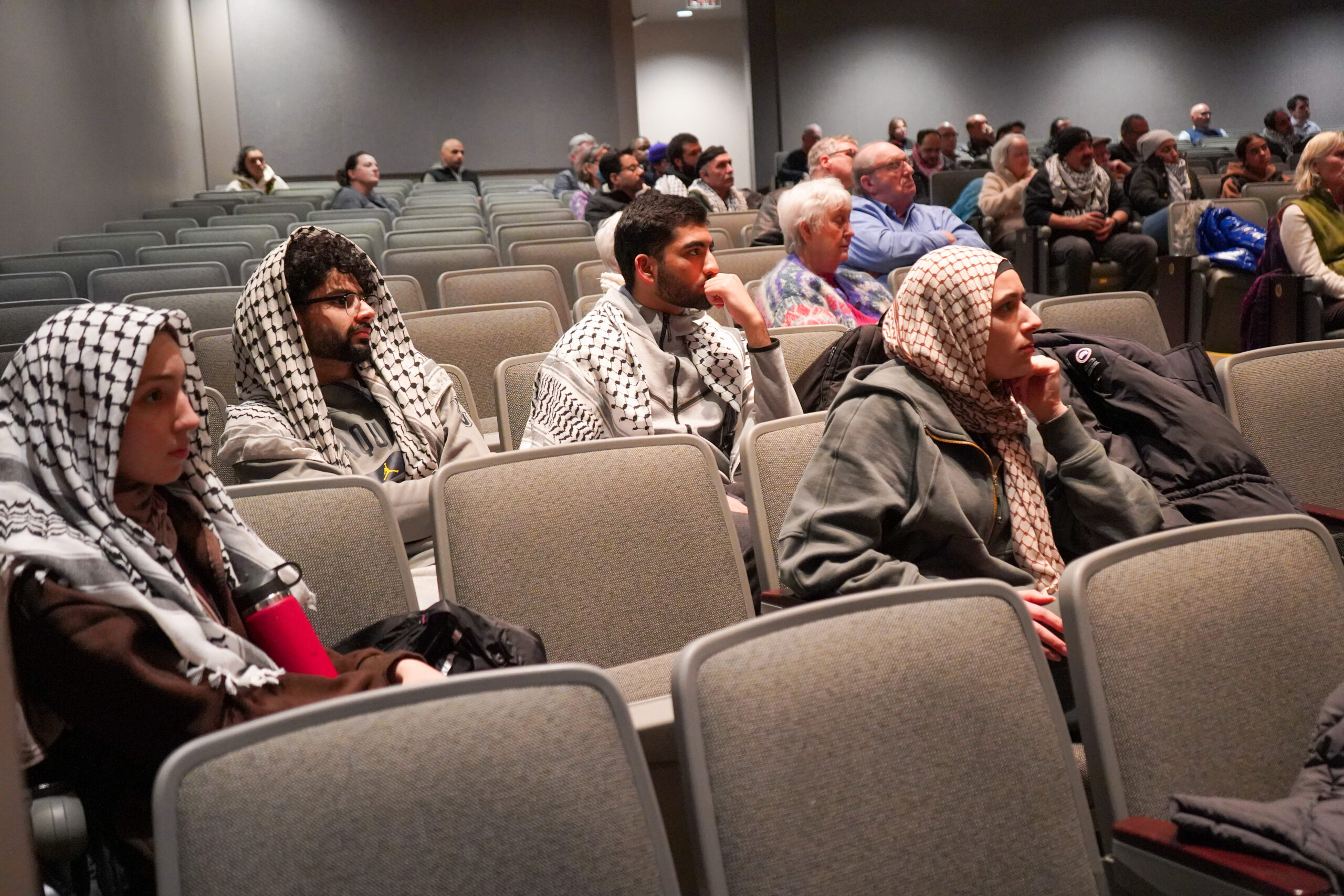
A young Palestinian man shared a text message he received that day from his family in Gaza detailing the horror of the Israeli military removing human remains in the streets with bulldozers.
It is “wedded to empire,” Rosen wrote. It “venerates Jewish power, Jewish militarism and Jewish privilege. … Although Israel was established through a mythology of Jewish liberation and a ‘return to the land,’ it has done so on the backs of that land’s indigenous inhabitants. The unavoidable truth is that the Jewish nation state has come into existence – and is continuing to justify its existence – through the oppression of the Palestinian people.”
American synagogues have signs in front with American and Israeli flags that proclaim, “We Stand With Israel,” he noted. “Congregational religious schools and Jewish camps routinely cite ‘cultivating a connection to Israel’ as an essential part of their curriculum. Perhaps most symbolically telling: it has become standard in most American synagogues to place a U.S. and Israeli flag on either side of the Aron Kodesh,” the ornamental chamber that houses the Torah scrolls. “In other words, in our most sacred Jewish spaces, we are literally bowing down to physical symbols of national power. … To my mind, it is nothing short of idolatry.”
In contrast, Tzedek Chicago’s Core Values state, … we do not celebrate the fusing of Judaism with political nationalism. We are non-Zionist, openly acknowledging that the creation of an ethnic Jewish nation state in historic Palestine resulted in an injustice against its indigenous people – an injustice that continues to this day.
We reject any ideology that insists upon exclusive Jewish entitlement to the land, recognizing that it has historically been considered sacred by many faiths and home to a variety of peoples, ethnicities and cultures. In our advocacy and activism, we oppose Israel’s ongoing oppression of the Palestinian people and seek a future that includes full civil and human rights for all who live in the land – Jews and non-Jews alike.
“With these words, we are intentionally standing down the new Jewish narrative,” Rosen wrote. The congregation describes itself as “non-Zionist” and openly protests “Israel’s ongoing oppression of the Palestinian people.”
“Given the centrality of Zionism and Israel advocacy in Jewish communal life, Tzedek Chicago is clearly a dissident congregation in the Jewish world,” Rosen wrote. From Tzedek Chicago’s core values, he further quoted:
Through our activism and organizing efforts, we pursue partnerships with local and national organizations and coalitions that combat institutional racism and pursue justice and equity for all.
“I do believe there are many who are thirsting for a Jewish community that espouses values such as these,” Rosen wrote. “To be sure, it is not easy to do this kind of work. It is challenging; it is painful; it can often mean being alienated or isolated from family and friends, from the larger community. But for so many of us, we don’t have a choice.”
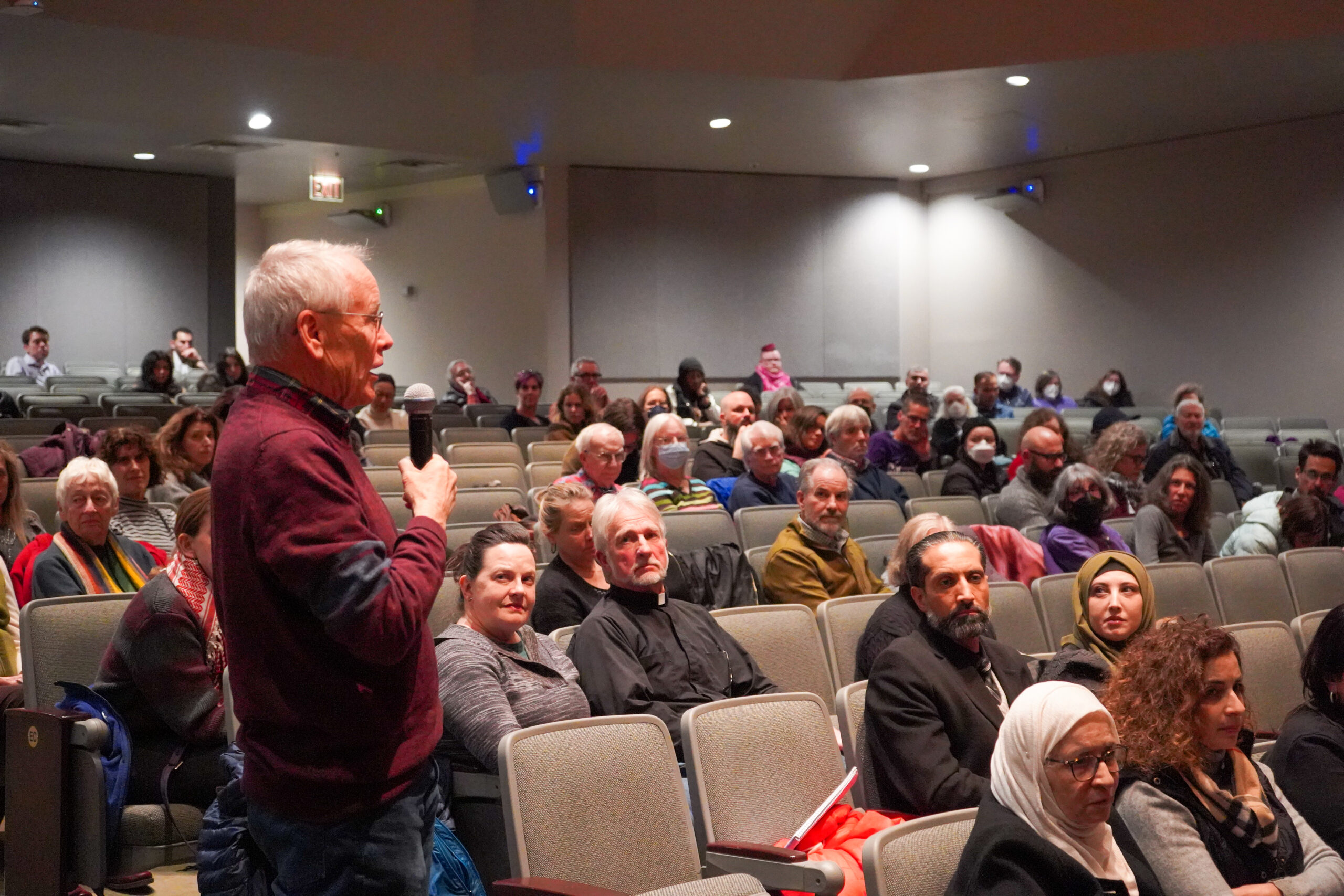
The event drew a diverse audience of educators, activists, clergy, students and anti war organizations that stimulated an enthusiastic Q & A.
Rising Jewish resistance to Zionism
Rosen last spoke at Marquette 10 years ago as one of the first programs sponsored by the Jewish Voice for Peace-Milwaukee, a new chapter in 2014. “Another military onslaught by Israel on Gaza had just concluded,” Rosen said during the recent MU program. “At the time, it felt like what had been experienced was nightmarish beyond comprehension. I don’t think any of us could possibly imagine the circumstances we would find ourselves in at the moment.”
On the other hand, we should not be surprised, he said. “What we are seeing right now is the logical conclusion of putting a majority Jewish state in historic Palestine,” he said. “This was inevitably what was going to happen. This is a process of dispossession that’s been going on for over 75 years.
“What we are seeing in Gaza now did not start Oct. 7,” he said. “It didn’t even start in 1948 with the Nakba, the dispossession of 750,000 Palestinians from their homes, creating the largest refugee population in the world.
It started at the very beginning of the movement to create a Jewish majority nation state in historic Palestine, he said. “The problem with the Zionist idea is when you seek to create an ethno-national state that is predicated on the identity of one group, people who are not part of that group are automatically a problem.
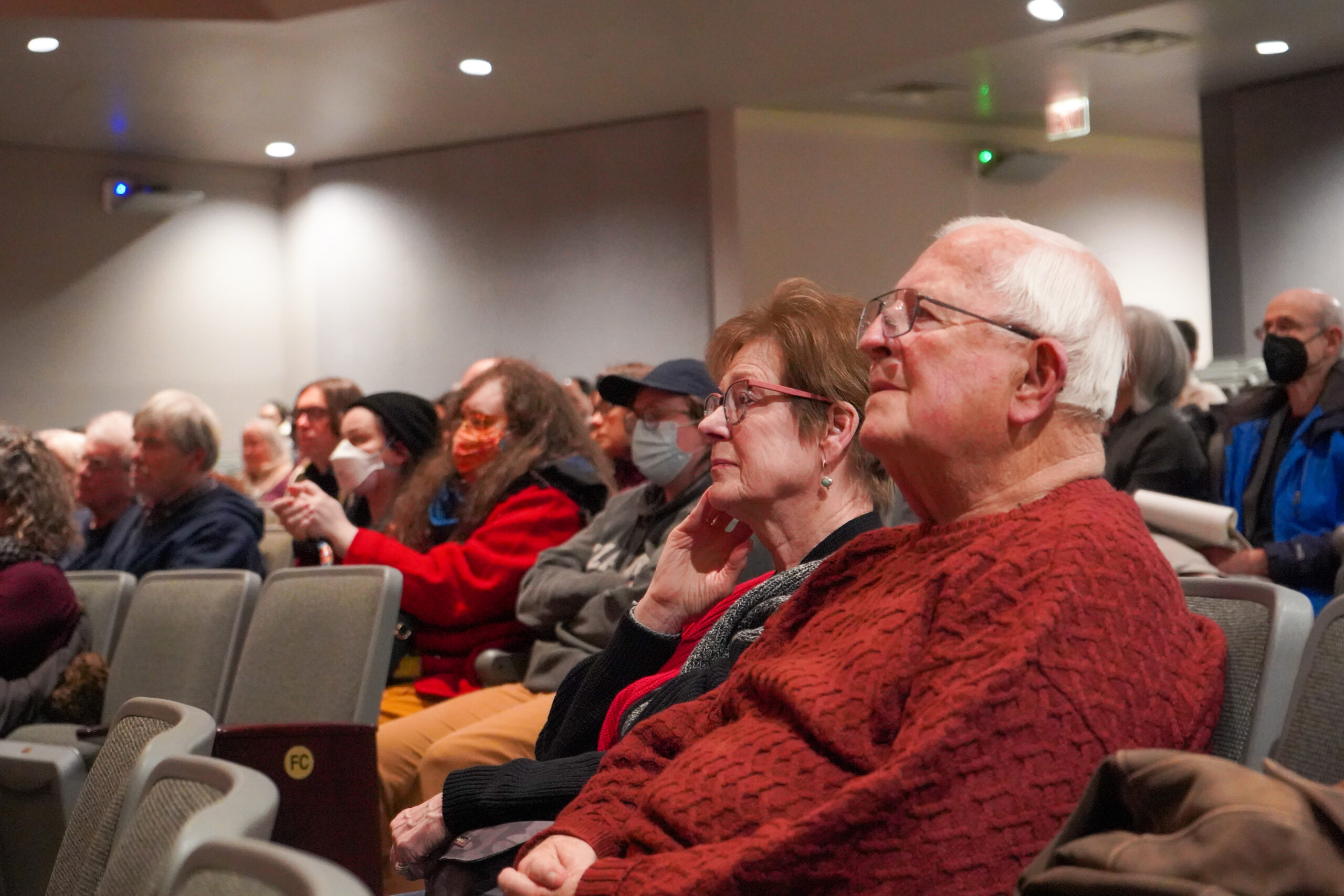
“The Nakba has never truly been over,” he continued. “Israel has been dealing with (Palestinians) in a variety of different ways over the last 75 years through ethnic cleansing, home demolition, revoking of residency permits and draconian demographic engineering.
“What we are seeing in Gaza right now, make no mistake, is not about Hamas,” Rosen said. “This is not about responding to Oct. 7. This is really about depopulating Gaza of its Palestinians. We know this because Israeli politicians are saying this out loud.
“This is about taking two million Palestinians off the demographic rolls, which is in many ways the end game of Zionism. I think it’s very important for Jews who understand that this is what is going on to stand up and say this out loud.
“The blinders are off now. Even before Oct. 7, the myth of Israel as the only democracy in the Middle East was crumbling,” he said. Multiple reports from human rights organizations—Human Rights Watch, Amnesty International, B’Tselem, an Israeli human rights organization, published reports that “unabashedly called Israel an apartheid state … not just in the West Bank or Gaza, but the entire country,” he said. Consequently, a growing number of Jews question their own and the U.S. government’s support of Israel, he said.
“In the Jewish community, we are seeing something that’s almost unprecedented,” Rosen noted. “The number of Jews, particularly young Jews, who are openly identifying as anti-Zionist, who are criticizing Israel, not simply for the policies of the government, but taking to task the very concept of a Jewish nation state in historic Palestine, that very concept is in and of itself a settler, colonial, apartheid racist concept.
We are creating a Judaism that breaks with support for a Jewish nation state, Rosen said, “a Judaism Beyond Zionism. I believe not only do we need to find the courage of our convictions when it comes to Israel-Palestine, but I truly believe it is important for those Jews who break with Zionism to openly say this out loud.”
